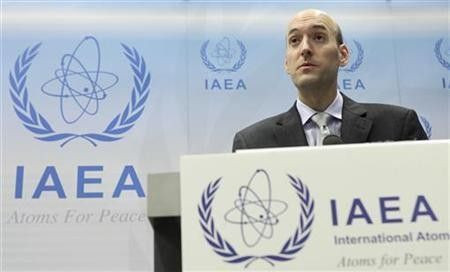Provocative U.S. Nuclear Chief Faces Political Test

(Reuters) - The embattled chief of the U.S. nuclear safety regulator found some powerful political support on Saturday ahead of Capitol Hill hearings next week that will scrutinize his bid to enact sweeping safety reforms.
Gregory Jaczko, chairman of the U.S. Nuclear Regulatory Commission, is locked in a bitter battle with fellow regulators over how to move forward on expensive changes for the nation's 104 nuclear reactors - reforms prompted by Japan's Fukushima nuclear accident in March.
The four other commissioners at the helm of the agency - two Democrats and two Republicans - took the highly unusual step of writing a formal complaint to the White House that Jaczko's "behavior and management practices have become increasingly problematic and erratic."
Senate Majority Leader Harry Reid defended Jaczko, a man he helped put into power. Reid dismissed the complaints as "a politically motivated witch hunt against a man with a proven track record of ensuring that nuclear power is produced as safely and responsibly as possible," a Reid spokesman said.
The White House declined comment on the spat, which will be the focus of a House Oversight Committee hearing on Wednesday and a Senate Environment Committee hearing on Thursday.
"We must move away from the 'do nothing' culture of the NRC," said Barbara Boxer, the Democratic chairman of the environment panel, criticizing the commissioners - William Magwood, Kristine Svinicki, William Ostendorff and George Apostolakis - for "attacking" Jaczko.
Jaczko told the White House in a letter this week he has done nothing wrong and has never behaved unprofessionally with his colleagues. He called some of their concerns "absurd."
The most powerful Republican on the Senate Energy Committee, Alaska's Lisa Murkowski, said Jaczko's alleged behavior was "unacceptable" and asked Obama to take action.
"The president needs to immediately address the concerns raised by the four commissioners if he wants members of Congress and the public to have faith in the agency," Murkowski said in a statement.
An NRC spokesman declined to comment. The commissioners did not immediately respond to requests for comment.
TENURE MARKED BY POLITICS
Jaczko was first appointed to the NRC in 2005, and his friends have described him as an independent thinker who made the politically powerful nuclear power industry nervous.
The NRC's post-Fukushima changes to safety regulations for existing plants are expected to cost millions for operators including Exelon and Entergy Corp.
Previously, Jaczko worked on Capitol Hill for Reid, who helped install him on the commission where he often found himself on the losing end of commission votes.
He has publicly prodded his commission to speed up, and has also chided industry about being slow to act. His critics have complained he has a short fuse.
In a memo, the four commissioners described him "storming out of an agenda planning meeting while a colleague was speaking," and complained that he yelled at them on the phone.
GLACIAL DECISIONS
The U.S. nuclear industry is the world's largest, and the regulator is admired around the world for its high standards.
But critics complain it takes the agency years to examine and act on changes - a plodding process that its supporters describe as methodical and necessary given the complexity of nuclear power.
Emails obtained by Reuters show a power struggle between Jaczko, seeking to take charge of the day-to-day decisions at the NRC, and the four commissioners, who sought majority-rule decisions and who resented Jaczko's efforts to cut them out.
The commission uses a complicated written voting process, and the internal emails showed commissioners and their staff working to build consensus, often against Jaczko.
In October, Jaczko told his fellow commissioners they were "bogging down this process in a seemingly endless series of papers" and trying to "micro-manage" post-Fukushima decisions.
In the email, Jaczko accused commissioners of looking for future openings to be able to nix staff decisions requiring expensive mandatory retrofits of nuclear plants.
In his letter to the White House, Jaczko complained the commissioners didn't understand the difference between their role and his, and said he has "about the same number of years of experience on the Commission as all four of them added together."
The commissioners have "established policies that have loosened the agency's safety standards," he said.
"While I personally worry about the long-term affect those decisions will have on the safety and security of the industry we regulate, I hold no personal animosity toward my colleagues for their policy views," Jaczko said.
© Copyright Thomson Reuters 2024. All rights reserved.











